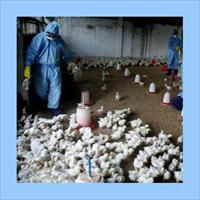TOGO: Officials to slaughter more poultry to fight bird flu spread

Officials have quarantined Agbata village in southern Togo, and plan to cull all poultry within a three kilometre radius, as they await lab confirmation of which avian flu virus killed 3,000 birds there on 09 September.
Authorities have already slaughtered about 1,500 birds that survived this week's bird flu epidemic in three poultry farms in Agbata, 10 km from the capital, Lome.
Togo’s government is awaiting lab confirmation to learn if it was the H5N1 virus, which was first discovered in Togo in June 2007.
The country’s livestock director, Komla Batasse Batawui, told IRIN that officials reacted as quickly as possible and are prepared to do more. “We deplore the fact that these farms lost 80 percent of their poultry. Seven rapid flu tests came back positive and we are waiting lab confirmation. Within the next three weeks, we will slaughter birds within three kilometres of this affected village.”
Batawui said farmers will be compensated for their losses, without specifying how much. The Ministry of Agriculture, Livestock and Fish has launched an appeal for international assistance to fight and prevent the spread of bird flu in Togo.
The West African pandemic advisor for the UN Office for the Coordination of Humanitarian Affairs, Liviu Vedrasco, says while compensation schemes are important, it is critical countries put in place good national pandemic response systems.
Though the virus has been mostly contained to poultry, the World Health Organization has estimated about 200 people worldwide have died from poultry-to-human H5N1 infections in the last five years.
Some experts say the unpredictable H5N1 virus, or still undiscovered viruses, may mutate and potentially spread among humans.
“This most recent outbreak [in Togo] keeps governments alert about the need to have a good human pandemic disaster plan in place [in case of person-to-person H5N1 infections] … It is important governments do not become complacent and think nothing needs to be done. This does not take money [per se], but rather it involves one government ministry talking to another,” said Vedrasco.
Several West African countries have reported similar cases of bird flu in poultry, with only Nigeria reporting one human bird flu death, according to the UN.
 Back and Next - Back and Next
Back and Next - Back and Next See Also - See Also
See Also - See Also